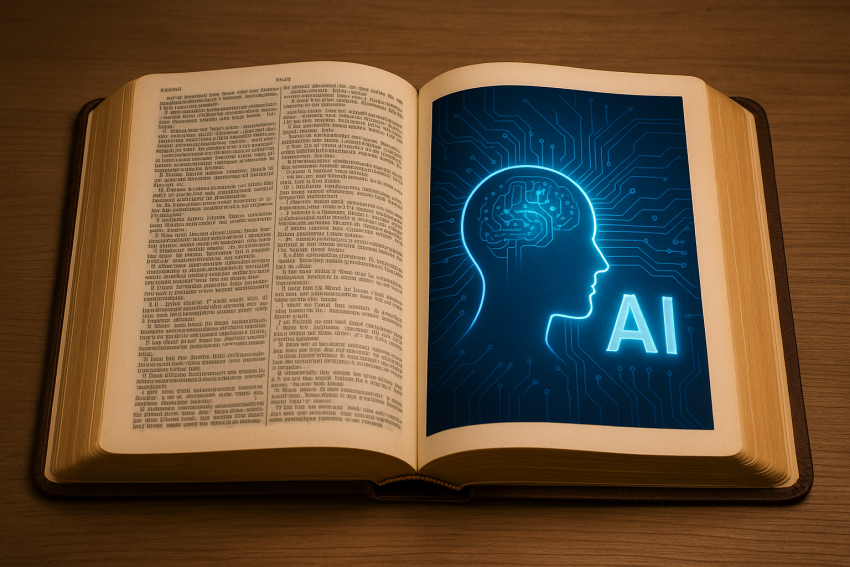We’re living in a moment where information moves faster than our ability to process it. Artificial intelligence—especially large language models (LLMs) have become woven into the way we search, think, decide, and sometimes even believe. As someone who straddles both the world of theology and the world of technology, I can tell you plainly: AI is powerful, valuable, and transformative… but it is not neutral.
And for followers of Jesus, that reality carries weight.
AI systems are built on patterns—trillions of words gathered from across the internet, shaped and distilled into answers that feel polished and authoritative. But here’s the danger: the more we let these systems do our thinking for us, the more we risk forgetting how to think. more we let these systems do our thinking, the more we risk losing the sanctity of individual thought. Proverbs 4:23 urges us, “Above all else, guard your heart, for everything you do flows from it.” What we consume shapes us. What we turn to for answers forms us. And when we outsource discernment to algorithms, we open the door to subtle shifts in thinking we may not even notice.
But the concern runs deeper still. More and more believers—and seekers—are turning to AI with questions they once brought to Scripture:
“What does this verse mean?”
“What does the Bible say about forgiveness?”
“What should I believe about this doctrine?”
The questions aren’t the issue. The substitute is. When we replace opening the Bible with querying an AI, we trade divine revelation for digital interpretation.
Paul reminds us, “All Scripture is God-breathed” (2 Timothy 3:16). Not summaries of Scripture. Not interpretations filtered through a model trained on an ocean of mixed worldviews. Just Scripture itself. There is something irreplaceable about wrestling with the Word personally—hearing the Spirit illuminate it, experiencing conviction or comfort that no algorithm can reproduce.
Let me paint two examples of what happens when Christians drift into relying on AI more than the Bible:
1. A Faith That Sounds Wise, but Lacks Depth
Picture a new believer hungry to grow. Instead of opening her Bible, she asks an LLM, “What does God say about suffering?” She receives a tidy, blended explanation—accurate in places, incomplete in others, and entirely without the Spirit’s transformative work. She walks away feeling informed… but not transformed.
AI can give answers. It cannot give revelation.
Hebrews 4:12 says the Word of God is “living and active.” AI-generated summaries are neither.
2. Doctrinal Drift Without Anyone Noticing
Most modern LLMs are not trained with a Christian worldview in mind, not biblical theology. They’re formed by the collective noise of the internet—blogs, forums, opinions, debates, skeptic arguments—all blended into one “neutral” voice. So imagine a Christian searching for clarity on a culturally sensitive topic:
“What does the Bible teach about marriage?”
“What does Scripture say about heaven and hell?”
Instead of receiving the weight of biblical teaching, they may receive a softened, culturally agreeable synthesis. Not heresy outright—just diluted truth. Slightly misaligned. Just enough to feel comfortable.
Over time, believers could start accepting AI’s version of Christianity as normal, drifting inch by inch from historic, orthodox faith. Not because they rejected Scripture—but because they quietly stopped opening it.
Not by malice—simply by design.
Over time, if believers take these softened answers as authoritative, doctrine drifts. Not through rebellion, but through subtle dilution. Faith begins to resemble cultural comfort more than biblical conviction.
Romans 12:2 warns us not to conform to the world’s patterns. If our primary teacher is trained on those patterns, how can our minds be renewed?
AI can be a helpful tool. It can assist study, provide context, or illuminate background. But it must never become our theologian, our pastor, or our Bible. Use it with gratitude—but also with guardrails.
Because God did not call us to algorithmic discipleship. He called us to abide in His Word. In a world drowning in digital noise, perhaps the most countercultural thing we can do is the simplest:
Close the app.
Open the Bible.
And let God speak for Himself.
Discover more from The Faith
Subscribe to get the latest posts sent to your email.
